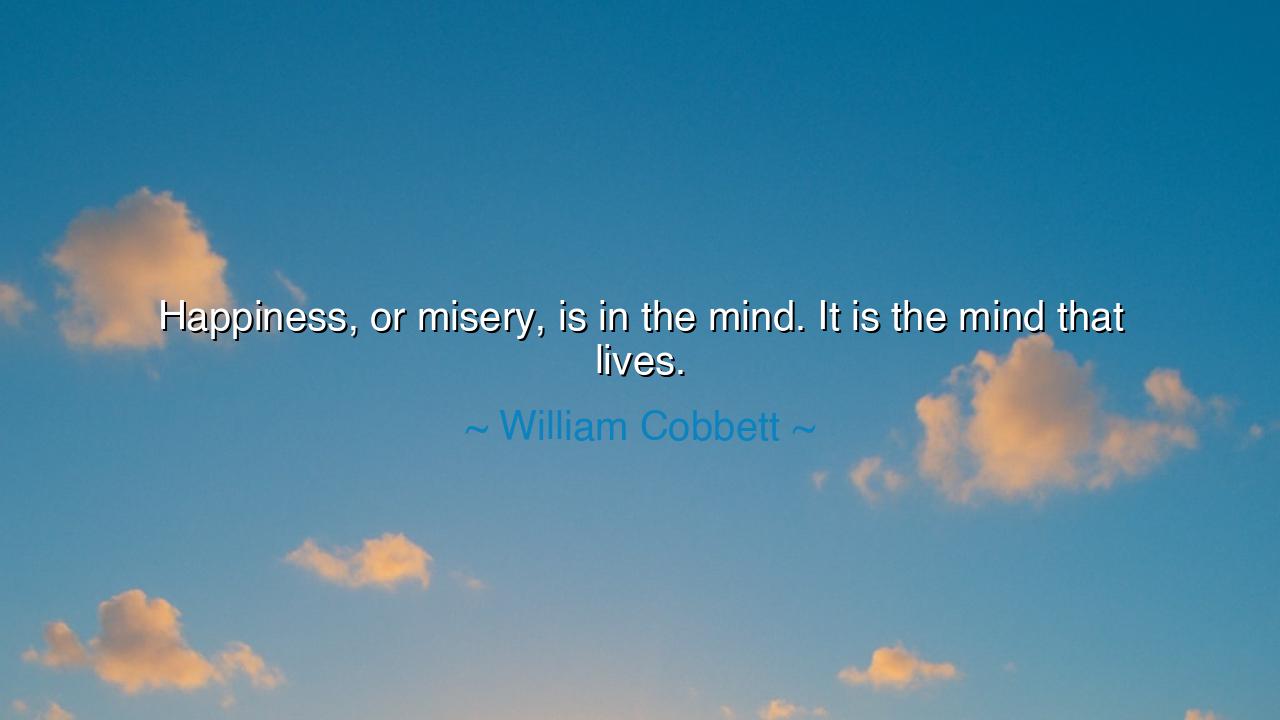
Happiness, or misery, is in the mind. It is the mind that lives.






The words of William Cobbett, “Happiness, or misery, is in the mind. It is the mind that lives,” strike with the simplicity of eternal truth—a truth that has echoed through the wisdom of every age. In these words, Cobbett reminds us that the seat of both joy and despair lies not in the shifting fortunes of the world, but within the quiet citadel of our own mind. The external world may rise and fall around us; wealth may come and go, friends may falter, and the body may grow weak—but the mind, sovereign and unyielding, remains the ruler of experience. Thus, the wise man learns that happiness is not given, but created; not found in circumstance, but forged within thought.
William Cobbett, an English writer and political reformer of the early nineteenth century, was a man who knew hardship intimately. Born into poverty, he worked his way up through toil and tenacity, speaking out against corruption and injustice in an age of turmoil. He endured imprisonment, exile, and financial ruin—yet through it all, he never surrendered his spirit. His words are not those of idle philosophy, but of experience tested by fire. He understood that a man’s freedom begins in his own mind. While others sought happiness in power, comfort, or approval, Cobbett found it in conviction—the unshakable belief that the life of the mind determines the life of the man.
This truth, though uttered in the language of Cobbett’s time, is as old as civilization itself. The Stoic philosophers of Greece and Rome taught that the wise man governs his inner world regardless of outer chaos. Epictetus, once a slave, declared that “men are disturbed not by things, but by the views they take of them.” Marcus Aurelius, emperor and philosopher, ruled an empire yet wrote in his private meditations that the soul becomes colored by its thoughts. Cobbett’s words echo this lineage of wisdom: he affirms that our happiness or misery does not flow from what happens to us, but from how our mind interprets and responds. The mind, therefore, is the true battlefield of life—the place where every victory or defeat begins.
Consider, too, the life of Viktor Frankl, the Austrian psychiatrist who endured the horrors of Nazi concentration camps centuries after Cobbett’s time. In those inhuman conditions, where the body was starved and stripped of dignity, Frankl discovered the same truth: that the mind lives even when all else perishes. Surrounded by suffering and death, he observed that those who survived with dignity were those who found meaning in their pain, who refused to let despair govern their thoughts. He wrote later, “Everything can be taken from a man but one thing: the last of the human freedoms—to choose one’s attitude.” Cobbett’s insight finds living proof in Frankl’s story: happiness and misery are indeed not the fruits of fortune, but the creations of the spirit.
The mind is the alchemist of life—it turns hardship into wisdom or bitterness, depending on how it is trained. The man who allows his mind to dwell on envy, resentment, or fear will find misery even in paradise. But the man who disciplines his thoughts toward gratitude, patience, and purpose will find contentment even in hardship. This is not to deny pain or injustice; it is to master them. For while the world may bruise the body, it cannot imprison the inner self unless one consents. The mind that lives rightly becomes a sanctuary, a source of strength that no tyrant, no misfortune, and no decay of flesh can destroy.
Cobbett’s words also carry a moral challenge. If happiness lies within the mind, then no one else can grant it to us, and no one else can be blamed for its absence. This truth demands self-mastery. The ancients called it the greatest victory—to conquer oneself. To rule the mind is to rule destiny; to let it run wild is to live as a slave to circumstance. The mind must be tended like a garden: free from weeds of bitterness, nourished with reflection, and open to light. For thoughts, once planted, grow into emotions, and emotions into actions. As the wise have said, “As a man thinketh in his heart, so is he.”
So, my listener, take this teaching as your compass: guard your mind, for it is the vessel of your life. When sorrow comes, do not let it dwell unchallenged; when joy arises, hold it with humility. Do not look outward for peace—it does not reside in gold, nor in applause, nor in comfort, but in the quiet strength of your own heart. Train your mind to see meaning in struggle, beauty in imperfection, and hope in every dawn. For it is the mind that lives, and through it, the soul learns to rise above the storms of fate.
In the end, William Cobbett’s wisdom endures because it names the deepest truth of existence: that man’s power lies not in what he possesses, but in how he perceives. Fortune may change, the body may weaken, but the mind—courageous, disciplined, and awake—remains the eternal flame. Tend to that flame, and you will carry happiness wherever you go, even through the shadows of life. For the man who rules his thoughts rules his world, and the mind that lives in harmony with itself lives forever free.






AAdministratorAdministrator
Welcome, honored guests. Please leave a comment, we will respond soon